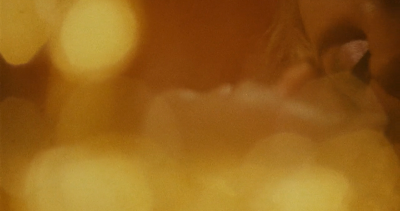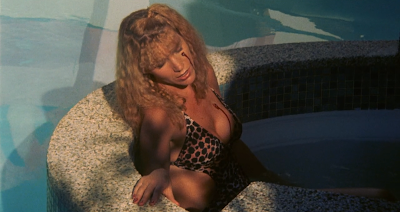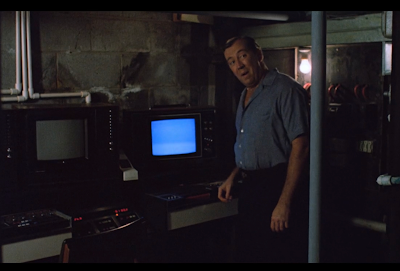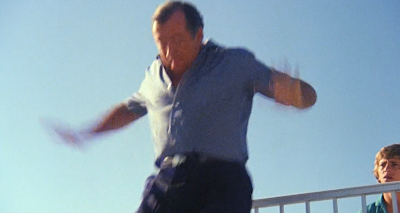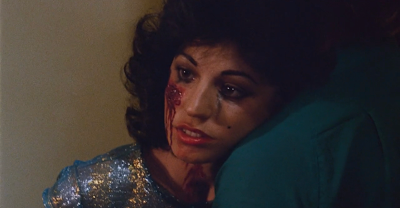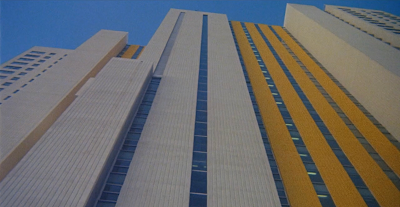It is time for a trip to Australia for 1980's Final Cut (not to be confused with 1998's Final Cut, or 2004's The Final Cut, or 2000's Urban Legends: Final Cut), also known as Death Games (not to be confused with 1977's Death Game). Final Cut is an Australian film about a documentary filmmaker profiling an immoral rock promoter rumored to be responsible for pornography and snuff films.
Some of your universe's critics, as usual, are less than enthusiastic about Final Cut. For example, reviewer FieCrier calls the film "A dreadfully boring movie that doesn't make much sense anyway." Reviewer vertigo_14 writes that the film offers "much nonsense and relatively little bang." And reviewer videorama-759-859391 writes, "It's definitely without interest."
Read on for the truth about Final Cut...
In the opening moments, one might be forgiven for believing they have stumbled upon a television crime show from the mid-1970s. A man carries a silver case up a stairway while music trills mysteriously. This is intercut with footage of a plan taking a long time to land. The staircase man opens the case and looks through a scope as an important businessman is interviewed by reporters on the airport tarmac. After the interview is over, it is clear the staircase man was not an assassin with a rifle but a filmmaker with a camera and tripod, recording the businessman from an inconvenient distance.
As the narrative begins, we are introduced to the Australian protagonists, a cameraman named Chris and a magazine writer named Sarah working on a documentary in secret. At her magazine office, Sarah tells a coworker that make a filmed documentary is different from writing an article because “The words come after it’s shot.” She says she’s excited about her new project.
Her colleague replies, “Well, it’s better than ‘100 Different Things to Do with a Pineapple.’”
Sarah quips, somewhat confusingly, “Now there IS a film.”
Outside the office, Chris picks Sarah up in his convertible. They trade witty quips, calling luxurious situations a “set.” Sarah tells him, “It’s only an hour’s ride to the coast, Chris, so take it easy.”
He responds cryptically, “I’ve got ten grand’s worth of gear in the back. And you in the front.”
“Exactly,” she says, understanding him perfectly.
(During their conversation, a traffic cop hands them a parking ticket, which they ignore without even acknowledging, which must be a cultural practice in your Australia.)
They reach the coast in preparation for the night’s filming on their subject’s yacht, and Chris pauses to film topless women surfing.
The wealthy subject of the documentary, rock promoter Dominic Black, hosts a party of wealthy and beautiful people on his boat (Chris previously described it as the most impressive yacht in Australia, though it is appears to be a medium-sized boat packed with people).
Sarah introduces herself to Mick Major, the yacht’s pilot who used to be a best-selling pop singer. Meanwhile, Chris films the party on board, though he misses potentially interesting occurrences such as a young model slapping Dominic, as well as a topless woman carrying champagne glasses. Chris does film Dominic speaking about how he never lets anyone know about his private life, raising the question of why he is allowing Chris to film him.
Also, Dominic implies awkwardly that he dabbles in creating pornography and snuff films. In perhaps the film’s most deeply philosophical exchange, Dominic says poetically, “Orgasm and death. Very like.”
An older woman in the room comments, “Un petite mort. A little death. Tried it, darling? A little death goes a long way.”
“But unlike real death…” says Dominic.
The woman completes his thought: “You can do it again and again.”
At night, after the party is over, Chris sits on the beach filming the moon, but he is surprised to see another topless woman, this one bloody, running along the beach. Of course, he films her until she disappears, apparently into the water. Chris falls down, drunk and unconscious. Someone steals the film reel from his camera as he sleeps.
The next day, at their apartment, Chris discovers the missing film roll. Sarah helpfully explains the situation, after watching more topless women on Chris’s editing table. “Your film? I thought it was an expose on Dominic, not party ladies.”
“He made skin flicks, maybe worse. That shows he’s still into exploitation.”
“And you’re not?”
“Horses for courses,” Chris says, using an idiom to presumably express that both he and Dominic are suited for exploitation filmmaking. “Anything I get on him, I’ll use.”
In the middle of the night, Sarah answers the phone and tells Chris they have been invited to Dominic’s penthouse for the weekend so they can finish filming. They drive to Dominic’s building, where they are watched on closed circuit video. After they’re buzzed in, they ride an elevator to the penthouse.
Bizarrely, Dominic’s partner takes off her wristwatch and drops it off the balcony to demonstrate, presumably, that they are in fact high up.
While Chris takes care of his camera equipment, Dominic gives orders using a gigantic telephone about stealing more of Chris’s footage, again raising the question in the audience’s mind of why Dominic is allowing Chris to film him.
On the penthouse balcony, Chris films Dominic some more. Dominic expounds on creative editing (saying that a filmmaker can create the perfect body: “Get Raquel Welch for the price of the girl next door”). Dominic guides the discussion to the relationship between Chris and Sarah. Referring to Sarah, Dominic says, “I think she’s a trifle more complicated than you imagine.”
“Why?” Chris asks. “Because she likes French dressing?”
“A good French dressing is a test of anyone,” Dominic says cryptically, “the maker or the maid.”
Yvette, the middle-aged woman who formerly starred in adult films and who translated “petite mort” earlier, taunts Chris by telling him as he films her, “Chris, darling, if you’re going to go on working like a maniac, you must eat like a maniac.”
Complaining about Chris always filming, Dominic tells him to hide the camera instead of carrying it around. “That’s the best way to get what you’re after, surely.”
After Dominic watches Chris and Sarah on a hidden camera, he decides to slip a chemical into not their drinks but food made in a food processor.
In the living room, the foursome of Chris, Sarah, Dominic, and Yvette decides to play a game of charades. “In deference to our guests, why not start with a movie title? That’s only fair.”
Chris responds tersely, “I make movies, I don’t watch them.”
The first charade is “Gentlemen Prefer Blondes.” The second is “Naked City.” The third is “Man with a Movie Camera.”
“That’s not a film,” protests Chris.
“Of course it is,” Sarah explains, showing that her knowledge of film exceeds Chris’s. “‘Man with a Movie Camera,’ the first real documentary. Dziga Vertov.”
“Oh,” Chris says.
Yvette comforts the cameraman: “Don’t let it hassle you, Chris. They’re both a pair of snobs. Anyway, a documentary isn’t a real film.”
Due to the drugs, Chris sleeps on the sofa while Yvette takes Sarah to the rooftop pool. As the “games” continue, Sarah encounters a half-inflated sex doll in the pool. Of course, she screams and swims away, as we realize the doll has blood on it, in a grotesque parody of the bloody woman on the beach.
Dominic suggests watching some of his secret films. He sits down for the camera and attempts to walk back his earlier comment about the possibility of snuff films. “I’ve heard of films where they do actually knock off the little darlings, but frankly I don’t believe it. Think of the problems. The crew talking, the questions, the hassles. No, I don’t believe it.”
Next, Sarah and Yvette have sex amid glittery gold sheets. In a clever bit of editing, the filmmakers show that their lovemaking is being recorded by Dominic’s hidden cameras, and the shot is framed so the coffee table looks a bit like a skull. While Sarah’s perception of sex is golden and hazy and heavenly, filling the frame, the video recording is stark, poorly framed, and surrounded by darkness.
The next morning, Chris and Sarah wander onto the balcony and see a woman in the jacuzzi. “There’s that bloody doll again,” Chris says, despite the fact it is clearly a real woman (who looks like Yvette) in the jacuzzi with blood on her face.
When they look back at the jacuzzi, the woman is gone, but there is blood in the water.
Dominic hands both of them drinks, which he has secretly drugged. He leads them to the living room, where a groggy Chris watches a groggy Sarah make love with a black-haired woman who has recently arrived to the apartment. Dominic eggs Chris on: “She’s taking Sarah away from you. Taking Sarah away. You’ve got to blow her away.” Dominic gives Chris a handgun.
After trying to fire the empty gun twice, Chris loads it and then fires it when the woman kisses Sarah.
Chris and Sarah suddenly wake up in bed. Was the gun murder a dream?
The answer is quickly revealed to be “no” as Chris and Sarah wander again into the living room to see Dominic watching a video on his projection TV — a video that shows (with suspenseful cuts) Chris shooting the woman in the eye.
“Convincing, isn’t it?” Dominic says.
“You faked it, you bastard!” Chris says.
“Faked? Yes. Maybe. Any intrusion of privacy makes things unreal. You invaded mine.”
Chris realizes Dominic is trying to blackmail them.
Suddenly, Yvette walks into the room, and Chris reacts as if he had shot Yvette in the video, though the woman kissing Sarah looked nothing like Yvette. Chris, relieved that he apparently did not kill Yvette, says, “Games. Silly bloody games!”
“Dear heart, the camera never lies,” Dominic says. “You’re in.” He explains that there is no way out for Chris and Sarah now that Dominic has videotaped blackmail on them.
Chris rushes into the kitchen and looks through cabinets, finding a handgun. When Yvette chases him, he pushes her against a wall and she falls down, apparently unconscious.
Ignoring Yvette, Chris confronts Dominic with the gun, attempting to get the incriminating videotape. Dominic leads Chris upstairs to his secret monitor cabinet. “This is my biggest toy yet,” he says. “From here I can shoot anywhere in the house.” He adds, “So much more fun than rock music.” (It is unclear why Dominic thought it necessary to add this last phrase; of course videotaping your own house using tiny monitors in a closet is more fun than rock music.)
Dominic takes a videotape from the closet. Chris follows him out to the balcony, where he is surprised by Yvette behind him. Chris shoots Yvette impulsively. When Yvette gets up, he shoots her again in a manner that can only be described as cruel.
“You stupid little man!” Dominic yells, climbing onto the balcony railing. “No imagination. Tapes can be duplicated, you know.” He twists the metaphorical dagger: “You’re dead. And do you know why? Because you can’t play and you don’t know the rules.”
Dominic climbs over the balcony railing and lets himself fall over the edge. (Chris doesn’t bother looking over the railing to see if Dominic has fallen to the ground.)
Chris takes the VHS tape, and he and Sarah try to escape the condominium. For unknown reasons, Chris opens a closet, only to find the body of the dark-haired woman inside.
Only after seeing the body does Chris realize Dominic might be playing a deadly game, so he runs back up to the balcony, finds a convenient rope, ties it to the railing, and rappels over the edge. This takes a considerable amount of time, but eventually Chris reaches the condominium below the penthouse. He sees a net that has been set up for Dominic and realizes Dominic did not kill himself.
Chris returns to the penthouse, gets his camera equipment (and Sarah), and makes his way to the elevator to the underground parking garage. They drive in their convertible out of the garage, nearly missing a closing garage door activated by Mick Major.
Then, in a series of edits that are as frightening as they are confusing, Sarah rolls out of the car and Chris slams into a piece of construction equipment that beheads him instantly. The car bursts into flame.
Sarah, injured and bloody, climbs to her feet and sees Mick Major. She looks at him knowingly. Then she rides the elevator back up to the penthouse in one of the film’s best composed shots.
Next to the pool, Dominic talks to Sarah. “So a girl died. Maybe more. I don’t really remember. Funny thing is, it didn’t work on film. Things look better when they’re faked. But the timing’s got to be perfect. I made it all too real.”
“Don’t worry, Dominic,” Sarah says. “I’ve learned to play the game.”
She pushes Dominic into the swimming pool, where he reveals he can’t swim before struggling in a few feet of water. When he reaches the edge of the pool, Mick Major steps on his hand, effectively drowning him. He looks at Sarah. She looks at him.
The final shot shows the video equipment in the secret closet recording Dominic’s murder. Presumably, Sarah and Mick will be the new producers of snuff videos to sell to collectors—videos of murders like a middle-aged man drowning in a swimming pool, which will no doubt make a hefty, hefty profit.
The End
Final Cut is a film that appears simple on the surface but reveals complexities when analyzed more closely. The story is about playing games, with Chris believing he can trick Dominic into revealing he is responsible for snuff films and Dominic believing he can use Chris as the victim of a real snuff film. Much of the trickery and cleverness, however, is difficult for the audience to make sense of. Various women are killed (possibly), but it is never certain if any of them are dead. It is also never certain if they are the same woman or different woman, in a vague tip of the hat to Buñuel's That Obscure Object of Desire (1977). There is also the eating of salads with French dressing, a condiment that Dominic either appreciates or loathes when he says "a good French dressing is a test of anyone." In the end, the audience can never be sure of anything in Final Cut, which is the mark of a classic film.



